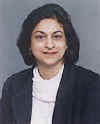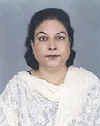| the-south-asian.com NOVEMBER 2001 | |||
| about us contact us data bank past issues the craft shop the print gallery | |||
|
NOVEMBER 2001 Contents Women's Issues Muslim
Women challenge
-Internet Banking & E-Govt in south Asia
Books
|
Page 3 of 4
Muslim Women challenging
Islamic Fundamentalism
Asma Jahangir and Hina Jilani L-R: Asma Jahangir and Hina JilaniInternationally known and respected advocates of women’s rights, and human rights, sisters Asma and Hina, from Pakistan, won this year’s Millennium Peace Prize for Women, an award to recognize women's contributions to preventing war and building peace. Twenty years ago they set up the country’s first all-women’s law firm, fifteen years ago they set set up AGHS Legal Aid, Pakistan’s first free legal aid centre, and were the founding members of Women’s Action Forum (WAF) – a women’s pressure group for women’s rights in Pakistan. Most recently, they have been the founding members of the Human Rights Commission of Pakistan. Both Asma and Hina are Advocates of the Supreme Court of Pakistan, the highest court of the country. Achieving the above has not come easy – they have both paid a heavy price to fight for what they believe in. Defending and representing victims of domestic, fundamentalist violence, and victims of human rights violations in a society that still carries feudalistic traditions, has not been easy. "As a result of their campaigns for peace and human rights, Asma and Hina have been arrested, received death threats, and faced hostile propaganda, intimidation, public abuse and murder attempts on themselves and their family." The Fundamentalists have accused them of ‘misguiding women’ and declared them ‘kafirs’ or non-believers. "An outspoken defender of justice since she was a student, Asma Jahangir was imprisoned for opposing Martial Law in 1983 and was a leading campaigner against anti-women laws in the early 1980s. She was one of the first in Pakistan to publicize and defend violations of human rights against women, bonded labour, child labour and religious minorities. Her defence of the rights of brick kiln workers, who are mostly bonded labourers in Pakistan, was successful in getting legislation passed in parliament in favour of bonded workers." Asma’s relentless work attains even more relevance when one takes into consideration the low literacy rates within the country, where most people are unaware of their rights and at times do not even comprehend the implications of what they have been charged with. This is where Asma and Hina have brought relief to many unsuspecting victims. Asma is also a leading voice in a people-to-people effort aimed at reducing tension between India and Pakistan and believes that peace in South Asia is possible if Pakistan returns to democracy. Addressing the Asia Society in New York last year, Asma commented on the staus of women in Pakistan - "A lot of women in Pakistan have become so inferior that unless you make structural changes, and critical changes, the plight of women in Pakistan is not going to improve." Commenting on the ‘Honour Killings’, she added, "So far, there has not been a single case of honor killing where a person has been convicted by the court." Despite the fact that it is common knowledge, in the case of Samia’s murder, who committed the murder, no one has been tried or punished.
"Asma has held a number of positions at an international level including with the International Centre for Human Rights and Democratic Development in Canada and LAWASIA in Australia. She is a board member of the Commonwealth Lawyers Association and the International Commission of Jurists in Geneva. In 1998 the United Nations Commission on Human Rights appointed Asma as a Special Rapporteur on Extrajudicial, Arbitrary and Summary Executions. She has visited Kosovo, East Timor, Mexico and Nepal in this capacity and has produced a number of reports." Hina Jilani is the Secretary General of the Human Rights Commission of Pakistan and runs AGHS, the free legal aid centre, which also provides shelter to women fleeing domestic or any other violence. She has defended the rights of women and children, and promoted religious tolerance, and spoken against 'honour killings'.
Copyright © 2000 - 2001 [the-south-asian.com]. Intellectual Property. All rights reserved. |
||

